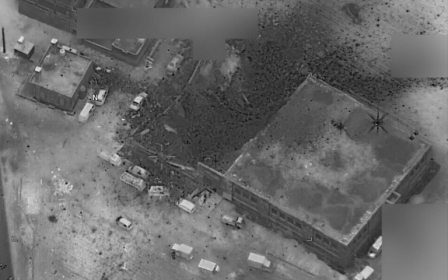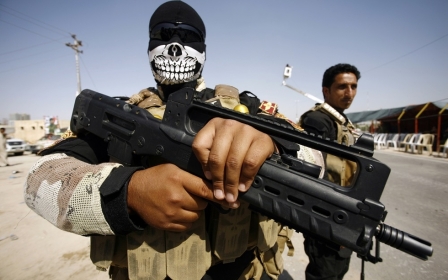Anti-IS talks may boost beleaguered Trump team

NEW YORK, United States – With the so-called Islamic State (IS) group on the back foot in Mosul, it may not a bad time for the Trump administration to dodge a chorus of domestic criticism and point to the group’s crumbling caliphate as evidence of gains under America’s new commander-in-chief.
United States President Donald Trump’s team may be doing just that. On Wednesday, foreign ministers from the 68-nation anti-IS coalition meet in Washington for two days of talks on toppling the religious militants in Iraq and Syria and ensuring they stay down.
They will doubtless have to grapple with thorny issues – how much cash and support Iraq needs to rebuild war-torn cities; and how to manage an assault on the de facto IS capital, Raqqa; and broker a much-discussed peace between Syria’s various warring factions.
But there is also a chance for Trump to bask in the glow of incremental military gains, as he faces mounting criticism over everything from his unreleased tax returns to claims of colluding with Kremlin hackers to win the White House in 2016.
“Almost regardless of who’s responsible for it, the incumbent president inherits the good news – even if the good news was on a track laid down earlier. So far, the counter-ISIS strategy appears to be working,” said American University professor Gordon Adams, using an alternate name for IS.
“It is slow progress, slogging in Mosul, lots of talk about Raqqa. But ISIS is slowly being rolled back. There’s no question in my mind that this president will turn any progress on the counter-ISIS effort into a massive vindication of his views,” he said.
Almost regardless of who’s responsible for it, the incumbent president inherits the good news
- Gordon Adams, professor
For Adams, a foreign policy scholar and the author of Mission Creep, Trump has merely “dialled up” the war strategy of his predecessor, Barack Obama, with small, recent deployments of extra Special Forces and artillery.
The Obama team used various tools to degrade IS, including training, advising and offering air support for Iraqi-led ground troops; deploying US Special Forces to Syria; halting IS oil sales and other financial pressure; and trying to counter the militant’s online propaganda.
'New ideas and approaches?'
The 22-23 March meet of foreign ministers is the first full-coalition sit-down since December 2014, shortly after it was founded. It is a chance for “the new administration to assess where we’re at and what we want to do going forward,” said State Department spokesman Mark Toner on Monday.
His boss, the top US diplomat, Rex Tillerson, will offer “new ideas and new approaches,” said Toner, though the administration has faced ongoing criticism for being slow to appoint key foreign policy officials and lacking know-how of world affairs.
Trump signed an executive order on 28 January requesting the Pentagon, Joint Chiefs of Staff and other agencies to submit a preliminary plan in 30 days for defeating IS. According to Toner, details of Trump’s so-called “secret plan” remain classified.
His recent budget will likely affect anti-IS efforts, should it gain traction in Congress. A $54bn boost to the Pentagon would increase US firepower, but 30 percent cuts on the State Department may hamper post-war reconstruction and diplomatic work.
IS has declared a caliphate in Iraq and Syria, but has been losing ground in both countries.
Iraqi forces are advancing deeper into west Mosul, facing stiff resistance from IS militants who have used suicide car bombs, snipers and human shields to defend the al-Nuri Mosque and other parts of the Old City in their last major Iraqi stronghold.
The Iraqi operation to retake the eastern bank of the city, launched in mid-October with support from the US-led coalition, took more than three months. The offensive to recapture west Mosul began less than three weeks ago.
The group has lost most of the cities it captured during a blitzkrieg assault across northern and western Iraq in 2014 and 2015. Few military experts doubt Iraqi forces will ultimately prevail over the militants, who are outgunned and outmanned.
In Syria, three separate forces, backed by the US, Turkey and Russia are advancing on Raqqa. More broadly, Russian airpower and Iranian-backed troops appear to be winning the six-year civil war for President Bashar al-Assad.
Uncomfortable policy shifts
Vanquishing IS in Syria remains tricky, as it may require uncomfortable policy shifts in Washington over cooperating with Assad and his Iranian backers, or at the very least taking military action that serves the interests of Assad and Tehran.
Meanwhile, the US must grapple with support for a Kurdish fighting force, the YPG, which has been an effective force against IS but is seen by Turkey as a Kurdish terrorist group within its borders.
Despite military gains, Adams pointed to policy weaknesses and said the US must break out of its “frozen diplomatic strategy” and decide whether to “put more assets in the game” with no-fly zones for warplanes in Syrian airspace and safe zones for civilians.
For Doga Eralp, a former United Nations and World Bank consultant on conflict resolution, the Trump administration has “no clear vision of the political future of Syria,” creating a roadblock to halt any anti-IS strategy.
“It’s time for the US to really start talking with its partners on the ground about which type of Syria it envisions. Would that be a Syria that operates through more consultation, a more confederated model, or would that be a more democratic Syria?” Eralp told MEE.
My worry is that many Americans will believe whatever Trump says about IS or anything else
- Jonathan Cristol, World Policy Institute
Coalition members will also discuss the likelihood of IS reverting to insurgency tactics once it loses ground. The group is increasingly employing such hits, and may have been behind a car bomb that killed more than 20 people in southwest Baghdad on Monday.
“Once Mosul and Raqqa have fallen, that will erode the IS narrative of establishing a caliphate and make their recruiting message less poignant,” Lawrence Korb, a former Pentagon official, told MEE.
“After that, they’ll resort to insurgent tactics. We’ve seen them cooperate with the Taliban in Afghanistan. It will be interesting to see whether they take steps to regroup with a re-emerging al-Qaeda,” he added, referring to the rival militant group behind the 9/11 attacks.
For Jonathan Cristol, a scholar at the World Policy Institute, a think tank, Trump will celebrate the toppling of IS while also taking advantage of any suicide bombings or other strikes the group carries out on US soil thereafter.
“My worry is that many Americans will believe whatever Trump says about IS or anything else. He will take credit for victories, and also use a later terrorist act to justify a dramatic escalation of the repression of American Muslims,” Cristol told MEE.
Negotiations in Washington are also an opportunity for coalition members to get face-time with officials from the two-month old administration, Trump family members and perhaps even the celebrity billionaire himself.
Many of the Arab delegates heading to Foggy Bottom will seek to ingratiate themselves with a new president who is less prone than his predecessor, Obama, to lecture them on shortcomings in their own countries, said human rights scholar Shadi Mokhtari.
“The Trump administration represents a final nail in the coffin of the 2011 Arab Uprisings, which were already headed down a very dark path,” Mokhtari, from the American University in Washington, told MEE.
“Dictators, particularly those in the Middle East, are pleased with Trump because they have never heard him use the words democracy or human rights. They gain a lot of latitude by simply saying they back the US president’s fight against IS.”
Stay informed with MEE's newsletters
Sign up to get the latest alerts, insights and analysis, starting with Turkey Unpacked
Middle East Eye delivers independent and unrivalled coverage and analysis of the Middle East, North Africa and beyond. To learn more about republishing this content and the associated fees, please fill out this form. More about MEE can be found here.




